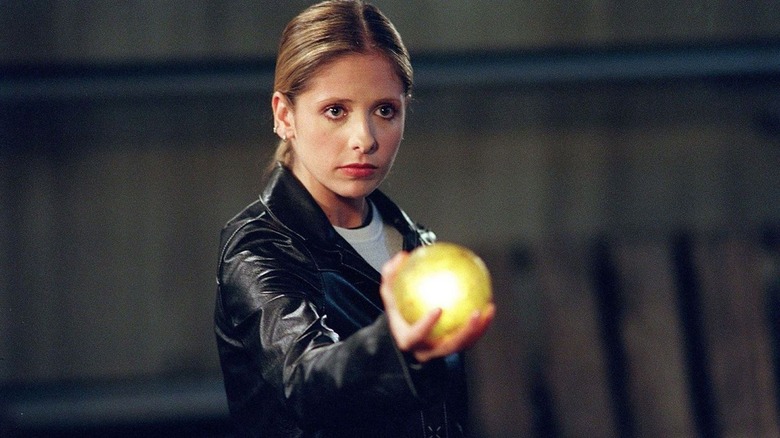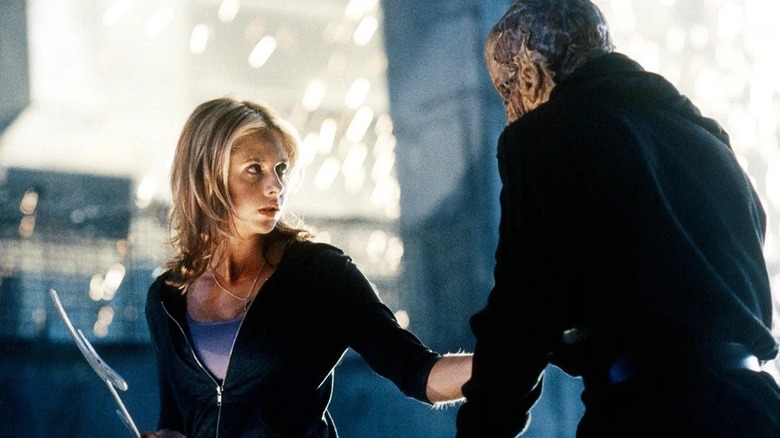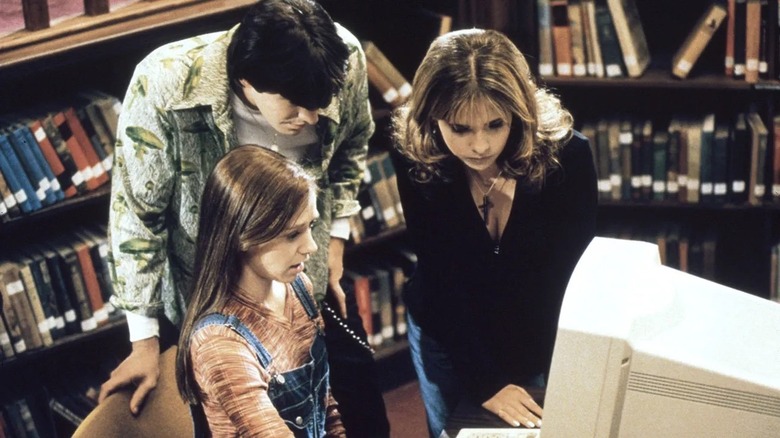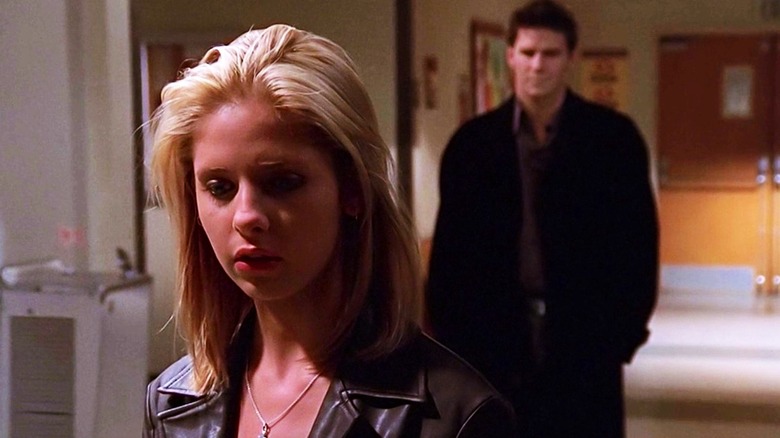A Star Wars Actor Was Put In His Place After Criticizing Buffy The Vampire Slayer
"Buffy the Vampire Slayer" was a groundbreaking series, but not everyone recognizes its genius. The show subverted sexist tropes that characterized women as helpless damsels in distress and painted men as their heroes. Buffy appeared to be completely powerless but secretly packed a huge punch. Some people believed that a woman could never be as strong as the Slayer — and some of those people were in huge Hollywood films like the original "Star Wars" trilogy.
The coming-of-age WB series is inherently supernatural, but that didn't stop people from criticizing "Buffy" for being unrealistic. Displays of superhuman strength are common in male-driven comic adaptations like "Spiderman" or "Thor," where the hero's powers originate from similarly mythical or science-fictional origins. But because Buffy is a teenage girl, some viewers couldn't wrap their heads around her capability.
Writer-director David Fury explained the necessity for a character like Buffy in the '90s media landscape in a cast and crew reunion interview with The Hollywood Reporter.
"Joss [Whedon, series creator] saw that there was a need for this feminist heroine at the time. It was a young girl who could still be real and flawed and everything that makes us human, but she's going to be the one that saves the world. Young girls and young women did not have anything like that. Everything was very male-oriented at the time. The characters weren't defined by their relationships with men. Often the men were defined by their relationship with the leading woman."
James Marsters, the actor behind Spike, Buffy's punk-rock vampire enemy-turned-lover, has also sung the praises of the show's feminist message. If the actor didn't already realize why the world needed "Buffy" at the time, years of working in Hollywood definitely proved it to him later on.
No woman that size could hit that hard
Spike might be the least feminist character in the series — and the one who compromises the empowering message of the show the most — but the actor who plays him is well-versed in the ways that "Buffy" challenged gender norms. "It was a show that was subverting the lie that women can't defend themselves, and it made certain people uncomfortable," Marsters explained. But there's no need to take his word for it — he has anecdotal evidence of just how much the show ruffled certain feathers in Hollywood.
"I remember talking to one of the original 'Star Wars' actors and he said 'Buffy' was a stupid show because no woman that size could hit that hard and defend herself that well. I said, 'I am so glad I am talking to you, buddy! By the way [...] There's three [stunt doubles for Buffy], they're multiple black belts and believe me they could kill us right here, right now, without breaking a sweat.' And then he kept going on and on and I said, 'How tall is Bruce Lee?' And that was the end of the conversation."
Marsters voices Captain Argyus in an episode of "Star Wars: The Clone Wars" that was released in 2008. Anthony Daniels, who plays C-3PO in the original trilogy, was reprising his old role for "Clone Wars" in the episode Marsters appeared in. Since the "Buffy" alum shared this story in 2017, it's possible that Daniels was the actor who made this comment, but this has not been confirmed.
Buffy was made to subvert expectations
It's no accident that Buffy's physical appearance and girlish personality completely contradicts her combat abilities and heroic will. This juxtaposition was actually the basis for the film that inspired the series of the same name, also written by Whedon. "I did want to make a movie where a poor girl that kills would have to get her own back," he told IGN. "Then, I started out with 'Martha the Immortal Waitress.' The idea of somebody that nobody would take account of, who just had more power than was imaginable."
As if being a blonde Valley Girl wasn't enough, a huge part of what makes Buffy so unsuspecting is her name. Phonetically, it calls to mind "fluffy" and "puffy," indicating that the girl who bears it would be soft and airy. "It was the name that I could think of that I took the least seriously," Whedon continued. "There is no way you could hear the name Buffy and think, 'This is an important person.' To juxtapose that with Vampire Slayer, just felt like that kind of thing – a B movie."
Although "Buffy" was a game changer in '90s television, it was far from the only female-led series that helped shift the tides. The show had its predecessors — like the "Wonder Woman" comic adaptation in 1976, which ran for three seasons. "I don't want to be a drop of water pretending I'm the whole wave," the "Buffy" creator clarified in an interview with The Hollywood Reporter, "but where that wave crashes, that's our beachhead — empowering women and young people, and making everybody matter."
However, lots of people have credited Whedon with starting the wave — including Nicholas Brendon, who plays Xander, Buffy's hapless male sidekick. "It changed the whole tapestry of TV," the actor concluded.
The flaws in Buffy's feminism
Now, as influential as "Buffy" was, it also had its fair share of flaws in feminist messaging. For one thing, the series creator was accused of misconduct by several actresses in the series, including Charisma Carpenter and Michelle Trachtenberg — the allegations against Whedon were documented thoroughly by Vulture in 2022.
As empowering as the WB series may be, its central metaphor is the brainchild of an incredibly troubled male psyche, the projection of a covertly misogynistic ego. Whedon even admitted himself that Buffy, the figure of the unlikely hero, is simply "a pathetically obvious metaphor for what I wanted my life to be." After feeling as though he had been overlooked his whole life — perhaps largely by women — "Buffy" was Whedon's opportunity to make people listen.
"Like, 'I'm the guy that nobody paid attention to,'" he elaborated. "What they didn't know was that I'm really important. I can save the world. So, you know, that's pretty cool, too."
With "Buffy," Whedon intended to make something more entertaining than ideological — "to make a feminist show that didn't make people feel like they were being lectured to," as he put it in conversation with The Hollywood Reporter. However, he recognizes that calling the show feminist means trying to measure it against ever-changing standards.
"I've said before, when you declare yourself politically, you destroy yourself artistically," he told Buzzfeed in 2015. "Because suddenly that's the litmus test for everything you do — for example, in my case, feminism. If you don't live up to the litmus test of feminism in this one instance, then you're a misogynist. It circles directly back upon you."
Whether "Buffy" lives up to the standards of feminist ethics or not, there's no question that it changed a few minds about what a woman can do, and a major "Star Wars" actor was one of them.



